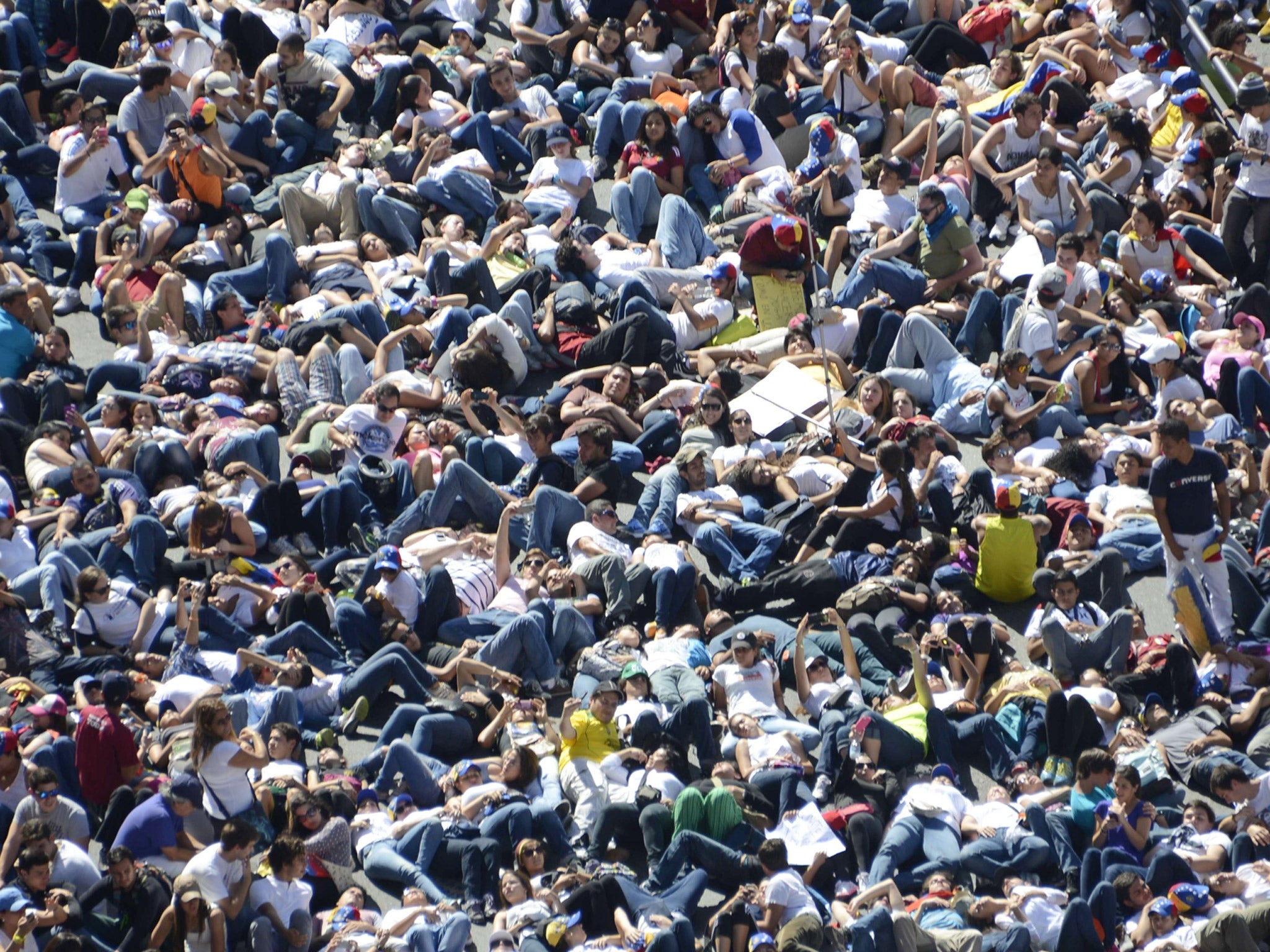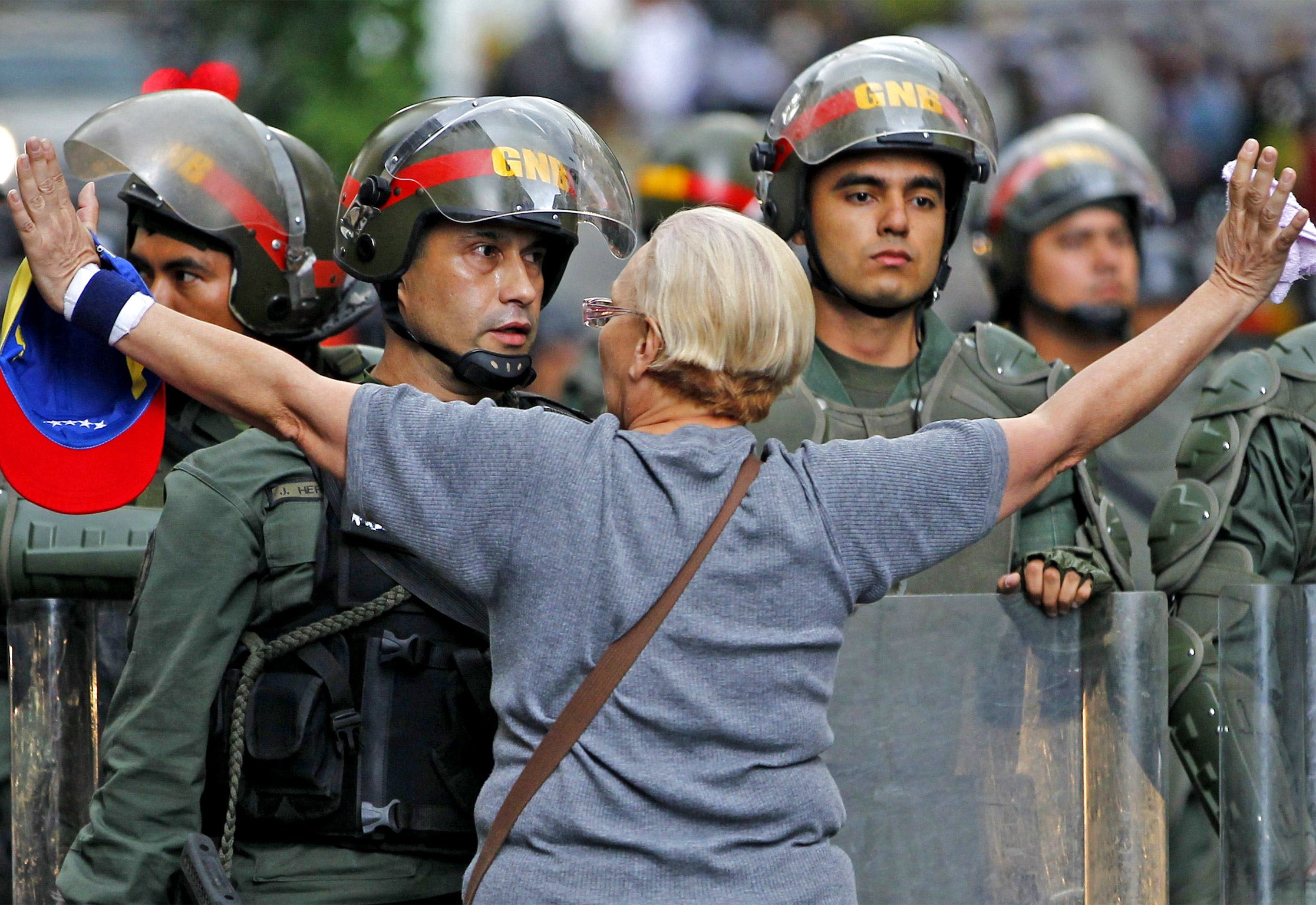The left has a blind spot on Venezuela. When will it acknowledge that Chavez's socialist dream has turned into a nightmare?
Students are protesting against crime and government repression

There was a time when the so-called Bolivarian Revolution in Venezuela appeared to hold great promise. I remember watching The Revolution Will Not Be Televised back in 2003 and being mesmerised by what I saw: here was a government spending the country’s oil wealth on social programmes for the poor and giving the rich a kicking in one of the most unequal societies in the Western Hemisphere.
The attempted military coup against president Hugo Chavez in 2002 seemed to make things clearer still. Chavez had threatened the profits of American oil companies; and as anyone familiar with Latin American politics will attest, those who do such things are rarely left in power for long.
Looking back, I have no trouble remembering which side I was on.
More than a decade on, however, the picture is far less encouraging. The status quo is now an ostensibly socialist one, and repression is being meted out by those with clinging to increasingly flimsy claim to represent 'el pueblo'.
In recent weeks students have taken to the streets in the capital Caracas to protest at the rising cost of living, rampant crime and government repression. And there is a great deal to be angry about if you are Venezuelan. Inflation has rocketed to more than 55 per cent, there are widespread blackouts and the staples of life are increasingly scarce. This, despite the fact that Venezuela is the most oil-rich country in the world. Crime is so rife in the big cities that many vulnerable Venezuelans are reluctant even to venture outside anymore. The murder rate in Caracas is 122 per 100,000 residents - higher even than Baghdad (as a Cuban friend of mine quipped last year, at least proper dictators like Fidel Castro keep the streets safe).
The response by the authorities to the protests has merely highlighted once again the government's unwillingness to tolerate dissent. Leopoldo Lopez, a former mayor and one of the protest organisers, has had an arrest warrant issued against him and videos have emerged of students being pistol whipped and kicked by armed policeman. As if taking its cue straight from the Soviet playbook, the government has blamed a “fascist upsuge” for the violence and “saboteurs” for the disintegration of the economy.

It may be true, as supporters of the Venezuelan government are fond of pointing out, that both Hugo Chavez and his successor Nicholas Maduro have been ‘democratically elected'. If one takes the view that democracy is defined simply as what happens on polling day, then the Venezuelan electoral system is arguably, as former US President Jimmy Carter described it, “the best in the world”. But as any honest person will tell you, democracy is as much about what happens in between elections as what occurs on polling day; and you don’t need to be shoved into a voting booth at the barrel of a gun to be living under tyranny.
In its 2012 report, Amnesty International said that “Human rights defenders [in Venezuela] were threatened and politically motivated charges continued to be used against government critics”. According to Human Rights Watch, “the accumulation of power in the executive branch and the erosion of human rights guarantees have enabled the government to intimidate, censor, and prosecute its critics”. In Britain there is an ongoing debate over the use of water cannons which the home secretary wants the police to have the power to deploy during unrest. The British left is in principle opposed to water cannons, as any civilised person should be. However I have just watched a video of Venezuelan protesters being water-cannoned and I have heard not a word of condemnation from the people who will be writing angry letters to the New Statesman if the same weapon is deployed on British streets. Why the double standard?
Unfortunately, supporters of the Chavez/Maduro government appear to be marooned in 2002, when a right-wing coup temporarily overthrew the then president Hugo Chavez. They are still of the belief that the media in Venezuela is overwhelmingly right wing and that the government is surrounded by hostile forces seeking to undermine the socialist revolution. In reality, it is the Venezuela state which is now the greatest threat to freedom and prosperity. In 2013 the last remaining independent television station in Venezuela was sold to an ally of the president and the government now has foreign news broadcasters and Twitter in its sights, pulling a Colombian news channel NTN24 off the air last week because it was providing too much coverage of the student protests. Maduro, who doesn’t appear to be particularly bright, has absurdly asked authorities to investigate the disappearance of 6,000 of his 1.4 million Twitter followers, branding it a “massive attack” by the “international right wing”.
Anyone who is genuinely concerned about the poor (rather than simply interested in sloganeering on their behalf) is obliged to recognise just how bad the situation in Venezuela is becoming as a result of the policies pursued by the government. Venezuela has one of the world’s “highest inflation rates, worst misalignment of the exchange rate, fastest-growing debts and one of the most precipitous drops in productive capacity”, as the former Venezuelan minister Moisés Naím put it.

As for poverty reduction, despite the plaudits lavished on the country by its Western cheerleaders, many of Venezuela’s neighbours have made a better fist of dragging their poorest citizens out of the gutter than the so-called ‘Bolivarian Revolution’. Between 2007 and 2011 there was a reduction in extreme poverty in Venezuela by some 38 per cent. Impressive no doubt. But the percentage of people who escaped extreme poverty in Brazil during the same period was 44 per cent, in Peru 41 per cent and in Uruguay 63 per cent. None of these countries possess anything like Venezuela’s vast oil wealth, yet all managed to lift their poorest citizens out of penury without the human rights abuses which have characterised the governments of Chavez and Maduro. Boring social democracy may be less romantic, but it has been far more successful at tackling poverty than the Chavez/Maduro model.
For those of us who do not have to put up with shortages, blackouts or arbitrary arrest, perhaps the worst part of the continued support offered to Maduro by many leftists is the ammunition it serves on a platter to the right. When it comes to the pinch, socialists will always sacrifice liberty for the ostensible promise of greater equality, these right wingers will say. While so many 'progressives' are happy to turn a blind eye to the abuses of the Venezuelan government, it is hard to disagree with them.
Join our commenting forum
Join thought-provoking conversations, follow other Independent readers and see their replies
Comments
Bookmark popover
Removed from bookmarks